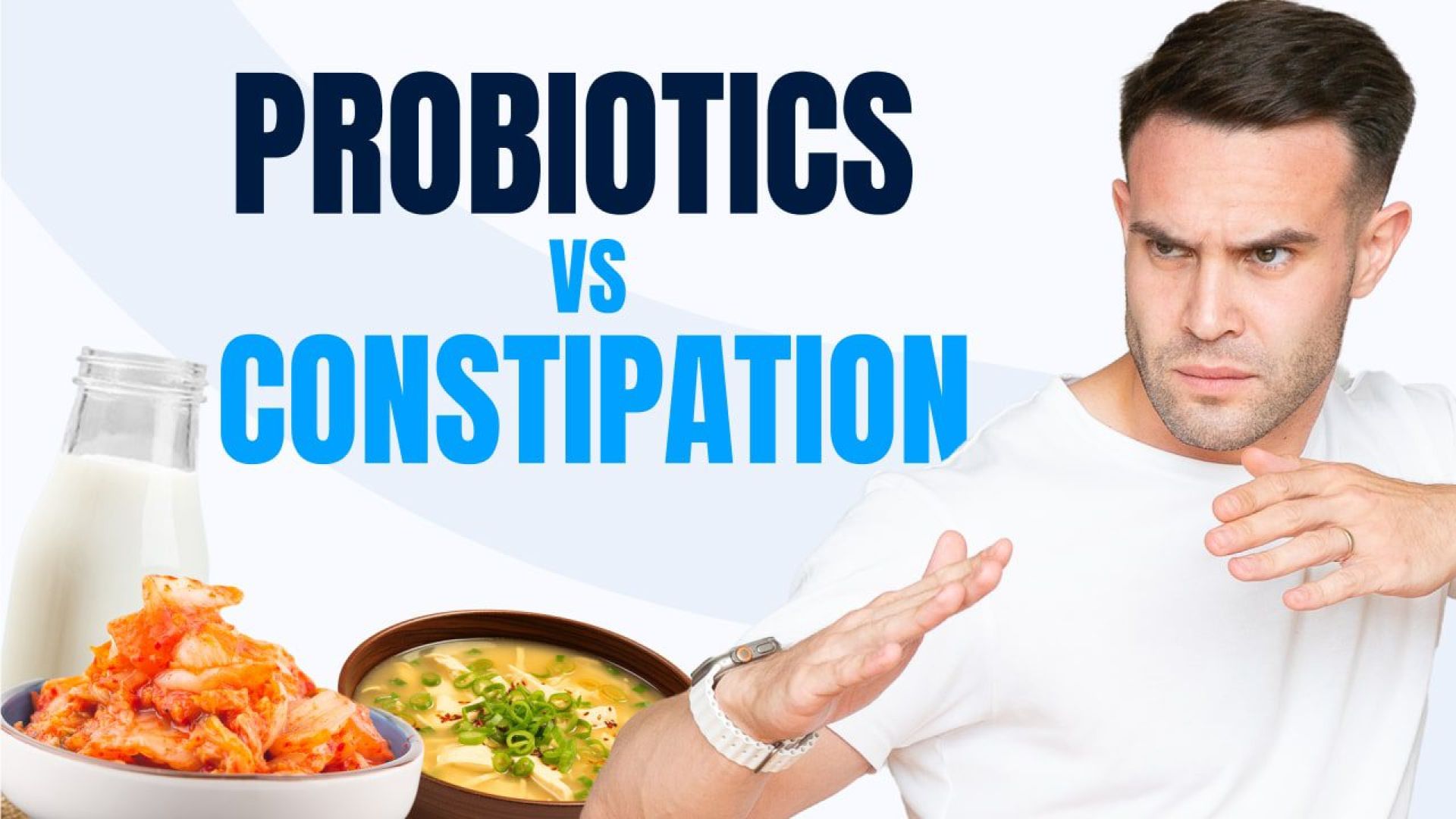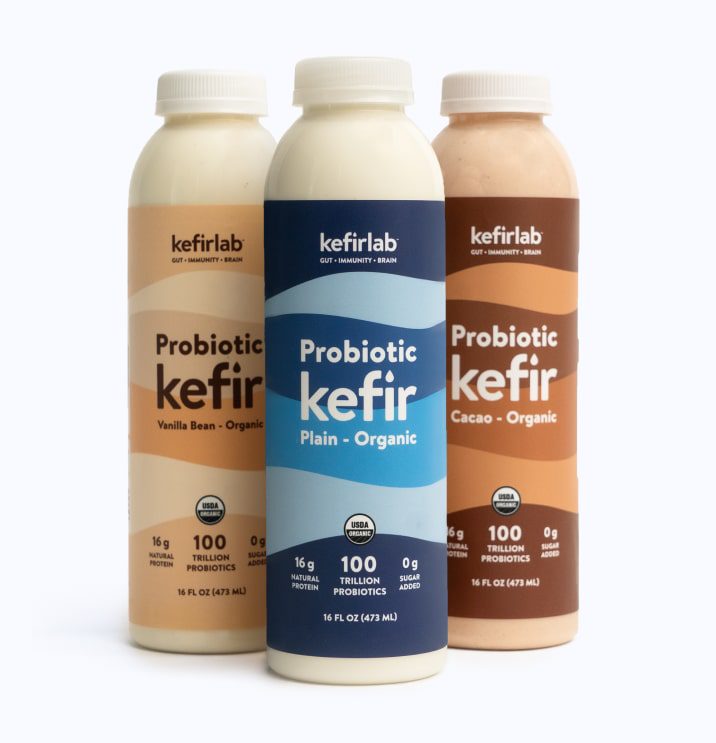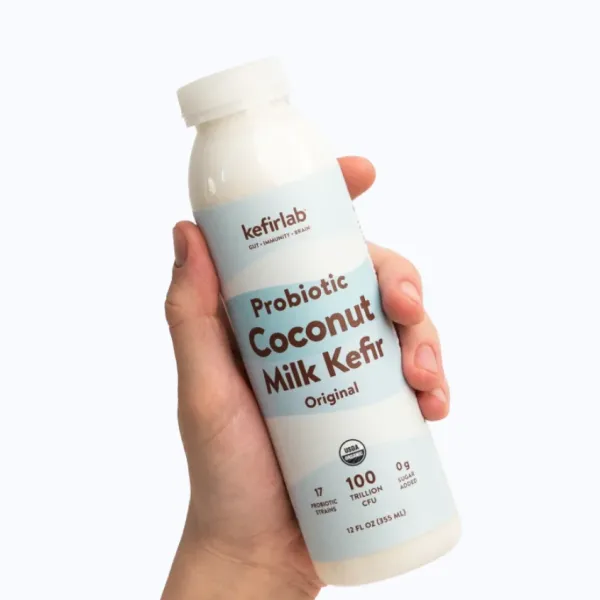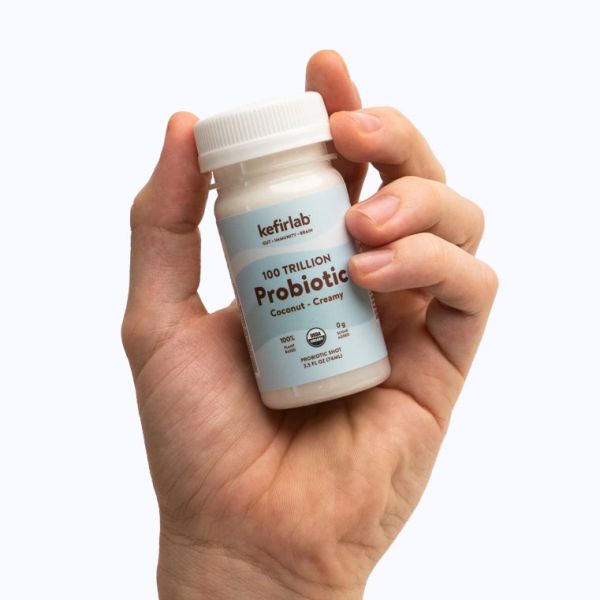Are Probiotics Good for Constipation? [Complete Guide]

In This Article you will learn…
If you’ve ever experienced the discomfort of constipation, you know how much it can affect your daily life.
In this comprehensive guide, we’ll explore how probiotics can help alleviate constipation, enhance gut health, and improve your overall well-being.
We’ll dive into what constipation is, how probiotics work, and which products can provide the best relief.
By the end of this guide, you’ll have a thorough understanding of how to use probiotics effectively to maintain regularity and promote a healthy gut.
Don’t like to read? Watch a video
What is Constipation?
Constipation is a common digestive issue characterized by infrequent bowel movements, difficulty passing stool, and a sense of incomplete evacuation.
It can cause bloating, discomfort, and a general feeling of sluggishness.
While occasional constipation is normal, chronic constipation can significantly impact your quality of life and may require medical attention.
Various factors, including a low-fiber diet, inadequate hydration, lack of physical activity, and certain medications, can cause constipation.
Understanding the root causes of constipation is essential for finding effective relief and preventing future occurrences.
What Are Probiotics?
Probiotics are live microorganisms, often called “good” or “beneficial” bacteria, that provide numerous health benefits when consumed in adequate amounts.
These microorganisms are similar to the beneficial bacteria naturally found in the human gut.
Probiotics can help balance the gut microbiome, support digestion, and enhance immune function.
There are several types of probiotics, with Lactobacillus and Bifidobacterium being the most commonly studied and used strains.
Each strain offers unique benefits, so choosing the right probiotic for your health needs is essential.
How Probiotics Affect Gut Health
Probiotics are crucial in maintaining a healthy gut microbiome for overall digestive health.
The gut microbiome is a complex community of microorganisms in the digestive tract.
A balanced microbiome helps with food digestion, nutrient absorption, and protection against harmful pathogens.
Probiotics contribute to gut health by:
- Enhancing digestion: Probiotics aid in breaking down food and absorbing nutrients more efficiently.
- Balancing gut flora: They help maintain a healthy balance of good bacteria, preventing the overgrowth of harmful bacteria.
- Strengthening the gut barrier: Probiotics improve the integrity of the gut lining, reducing inflammation and preventing toxins from entering the bloodstream.
- Supporting immune function: A healthy gut microbiome boosts the immune system, helping the body fend off infections.
By fostering a balanced and healthy gut microbiome, probiotics can significantly improve bowel regularity and reduce symptoms of constipation.
Can Probiotics Help with Constipation?
Research has shown that probiotics can be effective in relieving constipation.
Several studies have indicated that certain probiotic strains can improve bowel movements and alleviate the discomfort associated with constipation.
For example, a study published in the American Journal of Clinical Nutrition found that the probiotic strain Bifidobacterium lactis increased stool frequency and consistency in individuals with constipation.
Another study in the Journal of Gastroenterology and Hepatology reported that Lactobacillus casei Shirota improved bowel regularity in adults with chronic constipation.
The effectiveness of probiotics in treating constipation can vary depending on the strain and dosage.
It is vital to choose probiotic products that contain strains proven to be effective for constipation relief.
Best Probiotics for Constipation
Not all probiotics are created equal when it comes to relieving constipation.
Some strains have been specifically studied for their effectiveness in improving bowel movements and overall gut health. Here are some of the best probiotic strains for constipation:
- Bifidobacterium lactis: Known for increasing stool frequency and improving stool consistency, it is a top choice for constipation relief.
- Lactobacillus casei Shirota: This strain has been shown to enhance bowel regularity and reduce symptoms of chronic constipation.
- Lactobacillus rhamnosus GG: Effective in improving overall gut health and relieving constipation, particularly in children.
At KefirLab, we offer a range of probiotic products that contain these and other beneficial strains.
Our Probiotic Shots and Coconut Kefir are excellent options for incorporating these strains into your daily routine and promoting digestive health.
How to Incorporate Probiotics into Your Diet
Adding probiotics to your diet is simple and can be done in various ways.
Here are some practical tips for including probiotics in your daily meals:
- Start with fermented foods: Incorporate naturally fermented foods like yogurt, sauerkraut, kimchi, and kefir into your diet. These foods are rich in beneficial bacteria.
- Try probiotic supplements: Probiotic supplements can provide a concentrated dose of beneficial bacteria. Look for supplements that contain strains known for improving gut health and relieving constipation.
- Use KefirLab products: Our Dairy Kefir (available in stores) and Probiotic Shots are convenient and delicious ways to get your daily dose of probiotics.
- Stay consistent: To see the best results, consume probiotics regularly. Consistency is critical to maintaining a healthy gut microbiome and alleviating constipation.
Incorporating probiotics into your diet doesn’t have to be complicated.
By making small changes and using high-quality probiotic products like those from KefirLab, you can support your digestive health and reduce the risk of constipation.
Probiotics and Long-Term Gut Health
Regular intake of probiotics not only helps with immediate relief from constipation but also contributes to long-term gut health.
Maintaining a healthy gut microbiome is essential for overall wellness, and probiotics play a significant role in achieving this balance.
Long-term benefits of consistent probiotic use include:
- Enhanced digestive function: Continuous consumption of probiotics supports efficient digestion and nutrient absorption, reducing the likelihood of digestive issues.
- Improved immune system: A balanced gut microbiome strengthens the immune system, making the body more resilient to infections and illnesses.
- Reduced inflammation: Probiotics help reduce gut inflammation, preventing chronic diseases and improving overall health.
- Better mental health: There is a strong connection between gut health and mental well-being. A healthy gut can positively impact mood and cognitive function.
For sustained gut health, it’s crucial to incorporate probiotics into your daily routine.
KefirLab’s Coconut Kefir and Probiotic Shots are excellent options for maintaining a healthy gut over the long term.
Additional Tips for Relieving Constipation
While probiotics are a powerful tool for relieving constipation, combining them with other lifestyle changes can enhance their effectiveness.
Here are some additional tips to help alleviate constipation:
- Increase fiber intake: Consuming more dietary fiber can help add bulk to your stool and promote regular bowel movements. Fiber-rich foods include fruits, vegetables, whole grains, and legumes.
- Stay hydrated: Drinking plenty of water is essential for preventing constipation. Aim for at least eight glasses of water per day.
- Exercise regularly: Physical activity stimulates intestinal contractions, helping to move stool through the digestive tract. Try to incorporate at least 30 minutes of moderate exercise most days of the week.
- Establish a routine: To train your body to have regular bowel movements, try going to the bathroom at the same time each day.
- Consult a professional: For personalized advice, consider KefirLab’s Microbiome Analysis and Health Coach Services. These services can provide tailored recommendations to improve digestive health.
By combining probiotics with these additional tips, you can effectively manage and prevent constipation, ensuring a healthier and more comfortable daily life.
FAQ About Constipation and Probiotics
What is constipation, and what causes it?
Constipation is a common digestive issue characterized by infrequent bowel movements, difficulty passing stool, and a feeling of incomplete evacuation.
It can be caused by various factors, including a low-fiber diet, inadequate hydration, lack of physical activity, certain medications, and underlying medical conditions.
Stress and changes in routine can also contribute to constipation.
How can probiotics help with constipation?
Probiotics can help alleviate constipation by balancing the gut microbiome, crucial in digestion and bowel movements.
Certain probiotic strains, such as Bifidobacterium lactis and Lactobacillus casei Shirota, have been shown to improve stool frequency and consistency.
Probiotics enhance digestion, support the gut barrier, and reduce inflammation, contributing to better bowel regularity.
Which probiotic strains are best for relieving constipation?
The most effective probiotic strains for constipation relief include Bifidobacterium lactis, Lactobacillus casei Shirota, and Lactobacillus rhamnosus GG.
These strains have been extensively studied and proven to improve bowel movements and alleviate constipation symptoms.
Products containing these strains can help promote regularity and overall gut health.
How long does it take for probiotics to work on constipation?
The time it takes for probiotics to alleviate constipation can vary from person to person.
Some individuals may experience improvement within a few days, while others may take several weeks of consistent probiotic intake.
Taking probiotics regularly and as directed to achieve the best results is essential.
Can children take probiotics for constipation?
Yes, children can take probiotics for constipation.
However, it is vital to choose probiotic products specifically formulated for children and consult a pediatrician before starting any new supplement.
Probiotic strains like Lactobacillus rhamnosus GG are safe and effective for relieving constipation in children.
Are there any side effects of taking probiotics for constipation?
Probiotics are generally considered safe and well-tolerated.
Some people may experience mild side effects such as gas, bloating, or an upset stomach when they first start taking probiotics.
These side effects are usually temporary and subside as the body adjusts.
If you experience severe or persistent side effects, it is advisable to consult a healthcare professional.
How should probiotics be stored to maintain their effectiveness?
Probiotics should be stored according to the manufacturer’s instructions to maintain effectiveness.
Many probiotic products need to be refrigerated to keep the live bacteria viable.
Always check the storage requirements on the product label and ensure that the probiotics are stored in a cool, dry place away from direct sunlight and heat.
Can I take probiotics with other medications?
In most cases, probiotics can be taken alongside other medications.
However, it is always best to consult with a healthcare professional before starting any new supplement, especially if you are taking prescription medications or have underlying health conditions.
They can provide personalized advice and ensure that probiotics do not interact with your medications.
Are there any foods that naturally contain probiotics?
Yes, many foods naturally contain probiotics. Fermented foods such as kefir, yogurt, sauerkraut, kimchi, miso, and kombucha are rich sources of beneficial bacteria.
Incorporating these foods into your diet can help increase your probiotic intake and support gut health.
KefirLab offers a range of probiotic-rich products like Coconut Kefir and Probiotic Shots.
How can I choose the right probiotic supplement for constipation?
When choosing a probiotic supplement for constipation, look for products that contain specific strains known to improve bowel regularity, such as Bifidobacterium lactis and Lactobacillus casei Shirota.
Check the label for the number of live organisms (CFUs) and ensure the product has been tested for quality and potency.
KefirLab offers high-quality probiotic supplements designed to support gut health and alleviate constipation.
Conclusion and Takeaways
This comprehensive guide explored how probiotics can help relieve constipation and promote overall gut health. Here are key takeaways:
- Probiotics are crucial in maintaining a healthy gut microbiome and improving bowel regularity.
- Certain probiotic strains, such as Bifidobacterium lactis and Lactobacillus casei Shirota, are particularly effective for constipation relief.
- Incorporating probiotics into your diet through fermented foods, supplements, and KefirLab products can significantly benefit your digestive health.
- Combining probiotics with lifestyle changes, such as increasing fiber intake, staying hydrated, and exercising regularly, can relieve constipation.
For more information and tips on gut health, visit the Health Lab blog. To explore our range of high-quality probiotic products and services, visit KefirLab.
By understanding the importance of probiotics and making informed choices, you can achieve better digestive health and overall well-being.
Works Cited and Relevant Studies
- Dimidi, E., Christodoulides, S., Fragkos, K. C., Scott, S. M., & Whelan, K. (2014). The effect of probiotics on functional constipation in adults: A systematic review and meta-analysis of randomized controlled trials. American Journal of Clinical Nutrition, 100(4), 1075-1084.
- Ford, A. C., Quigley, E. M. M., Lacy, B. E., Lembo, A. J., Saito, Y. A., Schiller, L. R., … & Moayyedi, P. (2014). Efficacy of prebiotics, probiotics, and synbiotics in irritable bowel syndrome and chronic idiopathic constipation: Systematic review and meta-analysis. American Journal of Gastroenterology, 109(10), 1547-1561.
- McFarland, L. V., & Dublin, S. (2008). Meta-analysis of probiotics for the treatment of irritable bowel syndrome. World Journal of Gastroenterology, 14(17), 2650-2661.
- Miller, L. E., & Ouwehand, A. C. (2013). Probiotic supplementation decreases intestinal transit time: Meta-analysis of randomized controlled trials. World Journal of Gastroenterology, 19(29), 4718-4725.
- Rodriguez, L., Ruiz, L., de Los Reyes-Gavilan, C. G., Margolles, A., & Gueimonde, M. (2023). Impact of probiotics on constipation in adults: A systematic review and meta-analysis of randomized controlled trials. Frontiers in Microbiology, 14, Article 10502344.
- Videlock, E. J., Cremonini, F., & Camilleri, M. (2009). Meta-analysis: Probiotics in antibiotic-associated diarrhoea. Alimentary Pharmacology & Therapeutics, 30(8), 807-818.
Join Kefir Club
Like our probiotics, our emails are clean and good for you. Spam Free. Unsubscribe anytime.














